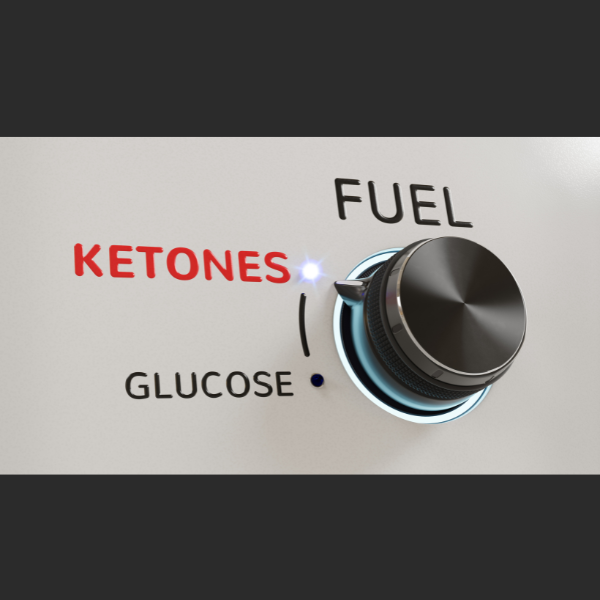
Brad King, MS, MFS
Ketogenic diets, characterized by a high-fat, adequate-protein, and very low carbohydrate intake, have been a significant focus in nutrition research due to their implications on body health[1]. The journey to ketosis, a metabolic state where the body primarily burns ketones, rather than glucose, for fuel, varies among individuals. Generally, it takes 2-4 days of consuming fewer than 50 grams of carbs per day for the body to enter ketosis[2].
Reducing carbohydrate intake to such a degree is the key to ketosis, but care must be taken with protein consumption too. Consuming excessive protein can push your body into gluconeogenesis (the synthesis of glucose), preventing the metabolic switch to ketones. While protein requirements vary, generally it should account for 15-25% of your total daily energy intake to ensure optimal ketosis[3].
The production of ketones has multiple beneficial effects:
Brain Health: The brain can use ketones as an alternative energy source when glucose is scarce. Research has shown potential neuroprotective effects, with ketones enhancing memory and cognitive functions, possibly due to increased mitochondrial efficiency and reduced oxidative stress[4].
Energy Levels: Ketones are a more efficient energy source than glucose, providing more energy per unit of oxygen consumed. This results in increased endurance performance and sustained energy levels, particularly advantageous for long-duration, low-intensity activities[5].
Gut Health: Emerging research suggests that ketogenic diets may modulate the gut microbiota favorably, promoting the growth of beneficial bacteria and reducing inflammation, although more studies are needed to fully understand this complex interaction[6].
Insulin Levels: By reducing carbohydrate intake, the ketogenic diet can decrease insulin spikes. It has been found effective in improving insulin sensitivity, which can benefit individuals with insulin resistance or type 2 diabetes[7].
Body Fat: Ketogenic diets have been demonstrated to aid weight loss by enhancing fat oxidation and creating a calorie deficit through reduced hunger and increased satiety from high-protein intake. This, coupled with the decreased insulin levels, facilitates fat loss[8].
Ketones can also be produced via supplementation. Exogenous ketones, like beta-hydroxybutyrate (BHB), can induce ketosis without dietary restriction. BHB can cross the blood-brain barrier and provide energy to the brain during periods of low carbohydrate intake. Research suggests they may provide some of the same health benefits as a ketogenic diet, such as improving cognitive function, enhancing athletic performance, and aiding in weight loss[9]. However, it's essential to remember that supplements can't substitute a healthy, balanced diet and lifestyle.
In conclusion, ketogenic diets and the production of ketones offer a multitude of health benefits. They demand careful planning and a solid understanding of nutritional needs, but the potential rewards are considerable.
References:
1 Paoli, A., Rubini, A., Volek, J. S., & Grimaldi, K. A. (2013). Beyond weight loss: a review of the therapeutic uses of very-low-carbohydrate (ketogenic) diets. European journal of clinical nutrition, 67(8), 789–796.
2 Kosinski, C., & Jornayvaz, F. R. (2017). Effects of Ketogenic Diets on Cardiovascular Risk Factors: Evidence from Animal and Human Studies. Nutrients, 9(5), 517.
3 Martin, W. F., Armstrong, L. E., & Rodriguez, N. R. (2005). Dietary protein intake and renal function. Nutrition & metabolism, 2, 25.
4 Newport, M. T., et al. (2015). A new way to produce hyperketonemia: use of ketone ester in a case of Alzheimer's disease. Alzheimer's & Dementia, 11(1), 99-103.
5 Cox, P. J., & Clarke, K. (2014). Acute nutritional ketosis: implications for exercise performance and metabolism. Extreme Physiology & Medicine, 3, 17.
6 Swidsinski, A., et al. (2017). Reduced mass and diversity of the colonic microbiome in patients with multiple sclerosis and their improvement with ketogenic diet. Frontiers in microbiology, 8, 1141.
7 Goss, A. M., et al. (2019). Effects of weight loss during a very low carbohydrate diet on specific adipose tissue depots and insulin sensitivity in older adults with obesity: a randomized clinical trial. Nutrition & metabolism, 16(1), 1-10.
8 Bueno, N. B., et al. (2013). Very-low-carbohydrate ketogenic diet v. low-fat diet for long-term weight loss: a meta-analysis of randomised controlled trials. British Journal of Nutrition, 110(7), 1178-1187.
9 Stubbs, B. J., et al. (2017). A ketone ester drink lowers human ghrelin and appetite. Obesity, 25(2), 297-302.